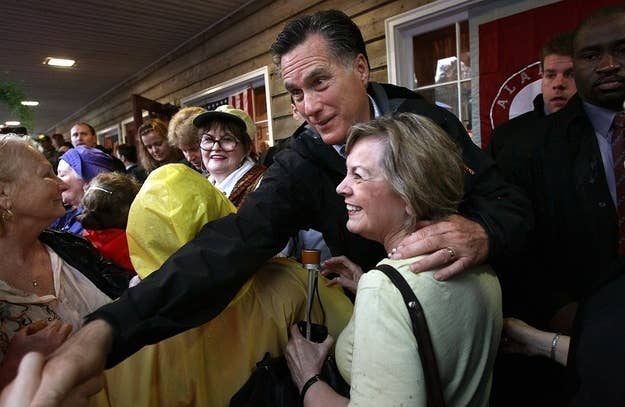
At a rally in Mobile Monday morning, Mitt Romney made headlines by unexpectedly predicting victory in tomorrow's Alabama primary — a contest where polls currently show him in a dead heat with Rick Santorum and Newt Gingrich.
"We're going to win tomorrow!" Romney declared to the crowd at the Whistle Stop restaurant. "We need your help."
The rhetoric could be interpreted as a show of confidence — possibly based on the campaign's own internal polls — designed to fire up supporters. But it wasn't the first time Romney has demonstrated election-eve bravado in the midst of a tight race — a habit that has sometimes come back to burn him.
In a primary race that has often boiled down to an expectations game, predicting victory is usually a lose/lose proposition. When the candidate is wrong, he looks weak and disorganized. And even when he ends up being right, the momentum of the victory is blunted by the notion — fed by the candidate — that victory was somehow inevitable here.
For Romney, the pattern began in Iowa, where, after months of setting low expectations for himself in the state, he suddenly changed his tone the night before the caucuses.
"We're going to win this thing with all our passion and strength," he told a crowd of supporters in Marion, IA. The next day Romney was declared the winner by an eight-vote margin— a narrow victory that was later revoked and awarded to Santorum after a recount.
It's unclear whether Romney's Iowa prediction actually served to embolden his supporters and increase caucus turnout for him. But when he was later handed the silver medal, the prediction served as fodder for opponents who content that he's a weak frontrunner with a habit of underperforming.
it did provide fodder for opponents who contend that he's a weak frontrunner with a habit of underperforming.
The Romney camp made a similar mistake in South Carolina. A week before the primary, the campaign released a web ad that confidently concluded with the prediction: "On Saturday South Carolina picks a president."
Gingrich, of course, wound up carrying the state.
Romney's occasional dabbling in political punditry hasn't always been proven wrong. As Florida polls showed his lead over Gingrich widening, Romney told a crowd of supporters, "With a turnout like this, I'm beginning to feel like we might win tomorrow."
And before introducing Kid Rock at an election-eve rally-cum-rock-concert, Romney told voters, "I'm gonna win in Michigan and I'm gonna win across the country." In context, it was clear the candidate was referring to the general election, but press reported that he was anticipating a win in the tight Michigan primary — and the campaign did nothing to correct the reports.
This may just be the burden of a frontrunner: He's always expected to win, and might as well cheerlead. But the upshot is that defeat is a bit more painful than it would otherwise be.
